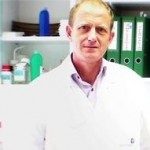Link to Pubmed [PMID] – 32903273
Link to DOI – 10.1371/journal.ppat.1008767
PLoS Pathog 2020 09; 16(9): e1008767
Many viruses target signal transducer and activator of transcription (STAT) 1 to antagonise antiviral interferon signalling, but targeting of STAT3, a pleiotropic molecule that mediates signalling by diverse cytokines, is poorly understood. Here, using lyssavirus infection, quantitative live cell imaging, innate immune signalling and protein interaction assays, and complementation/depletion of STAT expression, we show that STAT3 antagonism is conserved among P-proteins of diverse pathogenic lyssaviruses and correlates with pathogenesis. Importantly, P-protein targeting of STAT3 involves a highly selective mechanism whereby P-protein antagonises cytokine-activated STAT3-STAT1 heterodimers, but not STAT3 homodimers. RT-qPCR and reporter gene assays indicate that this results in specific modulation of interleukin-6-dependent pathways, effecting differential antagonism of target genes. These data provide novel insights into mechanisms by which viruses can modulate cellular function to support infection through discriminatory targeting of immune signalling complexes. The findings also highlight the potential application of selective interferon-antagonists as tools to delineate signalling by particular STAT complexes, significant not only to pathogen-host interactions but also cell physiology, development and cancer.
